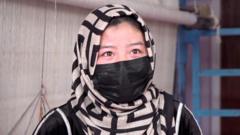The Taliban's restrictions on education have forced Afghan girls and women into the labor-intensive carpet weaving industry. Although the profession is one of the few open to them since the regime's resurgence, low wages and grueling hours leave many struggling to support their families while yearning for education.
Afghan Girls Shift to Carpet Weaving Amid Educational Barriers

Afghan Girls Shift to Carpet Weaving Amid Educational Barriers
With schools closed to girls under Taliban rule, many Afghan women have turned to low-paid carpet weaving as a means of survival.
In the crowded workshop in Kabul, the thunderous sound of weaving looms mingles with the soft murmurs of women and girls laboring under challenging conditions. Among them is 19-year-old Salehe Hassani, who heartbreakingly states, "We girls no longer have the chance to study… so we turned to the workshop." Since the Taliban's rise to power in 2021, education for girls over the age of 12 has been almost entirely extinguished, leaving many women with few options beyond manual labor.
The economic landscape has considerably worsened, with reports noting that only 19% of women were in the workforce before the Taliban took power, a stark contrast to the much higher rates of workforce participation seen in men. As a result, women like Salehe are embracing long days in the carpet weaving trade, which represents one of the limited job opportunities available to them. The United Nations estimates that about 1.2 to 1.5 million Afghan lives rely on this trade, with women making up nearly 90% of those employed in the sector.
Despite an alarming economic collapse reported by the UN, the carpet export market has seen substantial growth. In the first half of 2024, Afghanistan exported over 2.4 million kilograms of carpets worth approximately $8.7 million to several countries, including the U.S. and India. Unfortunately, the hard work of the weavers often yields meager financial returns; some earn just $27 for a square meter of carpet, which can take a full month to produce.
Nisar Ahmad Hassieni, an employer in the carpet industry, has approximately 600 women working in his facilities. He emphasizes that he values his workers, offering modest pay on a bi-weekly schedule. However, for many weavers, the wages barely suffice to meet basic family needs.
As the Taliban asserts that girls will eventually return to school, the lack of action continues to leave many aspiring students in limbo. Shakila, a 22-year-old weaver and former law student, recounts how her family’s carpet-making industry became their lifeline after being forced to withdraw from school due to security concerns following devastating bombings linked to the Taliban, which killed 90 people, mostly schoolgirls.
Echoing her sentiments, 18-year-old Samira shares a story of her traumatic experience during the attack, noting her desire to return to her studies. Despite lingering anxieties, Samira and her sisters recognize the dire situation and have committed to contributing to their family's income through weaving.
The resilience of these young women shines through even in adversity. Salehe is learning English independently and harbors hopes of building a top-tier hospital in Afghanistan one day. “Even though schools are closed, we refuse to stop our education,” she insists. The carpet weaving workshop has become a commitment to survival for Afghan girls, reflecting their determination in a time of profound uncertainty.






















